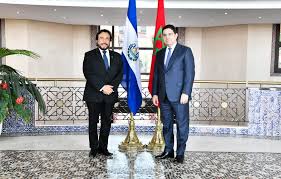
07 March 2025 – Makkah
Morocco’s Minister of Foreign Affairs, African Cooperation, and Moroccan Expatriates, Nasser Bourita, reaffirmed on Thursday in Makkah the Kingdom’s steadfast commitment to deepening its strategic partnership with the Gulf Cooperation Council (GCC) states.
Speaking at the joint ministerial meeting between Morocco and GCC member states, Bourita emphasized Morocco’s dedication to strengthening collaboration with its Gulf partners, ensuring that the partnership continues to evolve and deliver mutual benefits.
Strengthening Bilateral Ties
Bourita highlighted Morocco’s determination to enhance cooperation across various sectors, stating, “Through our collective commitment and the guidance of our leaders, we will rise to the challenges ahead and elevate our partnership to meet the aspirations of our peoples for progress and prosperity.”
The Minister expressed satisfaction with the progress made in Morocco-GCC relations, particularly in strategic, political, economic, cultural, and developmental areas. He noted that this advancement aligns with the directives of His Majesty King Mohammed VI and the leadership of GCC nations.
Renewing the Strategic Action Plan
As part of this collaboration, Bourita announced that the Morocco-GCC joint action plan has been renewed for a new phase extending to 2030. He emphasized the need to expand economic cooperation by fostering stronger ties between business communities and encouraging investment initiatives that stimulate growth and job creation.
He welcomed the organization of the Morocco-GCC Investment Forum, which aims to facilitate economic exchanges and attract Gulf investments to Morocco. Bourita also highlighted Morocco’s readiness to host major international sporting events, such as the 2025 Africa Cup of Nations and the 2030 FIFA World Cup, presenting significant investment opportunities for GCC enterprises.
Morocco: A Gateway to Africa
Bourita underscored Morocco’s strategic position as a gateway for Gulf countries to the African continent. He cited key initiatives led by King Mohammed VI, such as the Royal Initiative to enhance Sahel nations’ access to the Atlantic Ocean, the Atlantic African States Process, and the Nigeria-Morocco gas pipeline project as crucial frameworks for regional development and cooperation.
Solidarity and Regional Stability
Referring to the deep-rooted solidarity between Morocco and the GCC, Bourita recalled King Mohammed VI’s statement at the 2016 Morocco-Gulf Summit, where he affirmed: “Morocco considers the security and stability of Gulf countries as an intrinsic part of its own security and stability. What affects you affects us.”
The Minister stressed the importance of unity and wisdom in addressing the challenges facing the Arab world. He urged collective decision-making based on insight rather than divisive rhetoric, particularly given the rapidly evolving geopolitical landscape.
Commitment to the Palestinian Cause
Addressing the Palestinian issue, Bourita reaffirmed Morocco’s unwavering support for the two-state solution, which envisions an independent Palestinian state along the borders of June 4, 1967, with East Jerusalem as its capital. As Chairman of the Al-Quds Committee, King Mohammed VI remains actively engaged in diplomatic efforts to advance this cause and support peace initiatives.
Addressing Regional Crises
Concerning ongoing conflicts in Syria, Lebanon, Yemen, Sudan, and Libya, Bourita acknowledged the complex challenges these nations face. He emphasized the need to safeguard national sovereignty and territorial integrity while advocating for inclusive governance and rejecting external interference.
Morocco’s Foreign Minister reiterated the Kingdom’s enduring commitment to fostering a robust and dynamic partnership with the GCC. As both sides continue to navigate regional and global challenges, the Morocco-GCC alliance remains a cornerstone of stability, prosperity, and cooperation in the Arab world.





